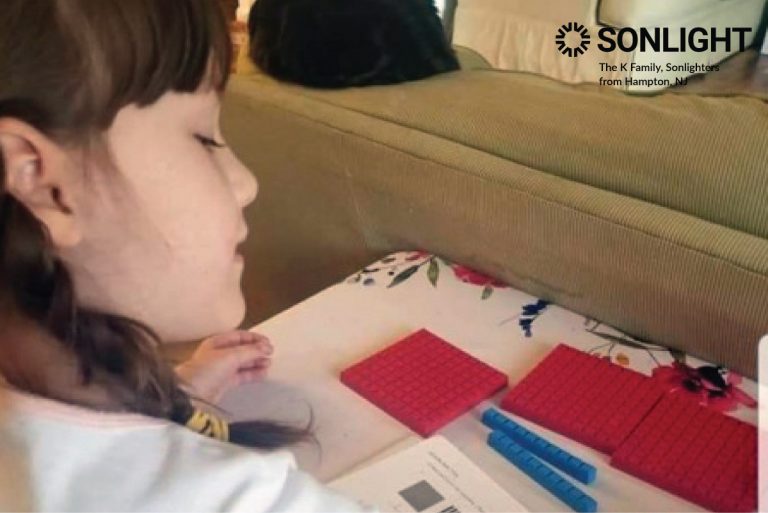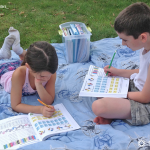You’re just settling into your school routine, and you have a nagging feeling that your child’s math skills aren’t quite up to par. You’ve noticed that they are dreading math time more and more, and you know that you need to turn the ship around before it goes down. Are they behind in math? It's time to find out.

It’s a good thing that you are homeschooling. What you are seeing now would possibly take a few months to show up in a public school setting. So first things first: Don’t beat yourself up!
Ebb and flow in education is completely normal. A child’s education can oftentimes be best described as “two steps forward, one step back.” The great thing is that you have noticed it, probably fairly early, and you are in a great position to do something about it!
But what to do?
Not to worry! I’m here to help. I've been around the block and have dealt with many issues. As a veteran homeschooler, I know how to shore up lags in learning, and I’m happy to assist you. Here are a few resources to use as soon as you notice your child is struggling in math.
1. Manipulatives
Math instruction can be a bit abstract. For a struggling mathematician, it is important to make it as concrete as possible, so you will need to secure a supply of manipulatives for your child to use. This can be as easy as grabbing a handful of paperclips or M & M’s for your child to count, add, or divide. Some manipulatives can be printed out like base-10 blocks. You could also use coffee stirrers or popsicle sticks to bundle groups of ten.
However, if you prefer to have long-lasting manipulatives ready to go, I recommend the RightStart Math Set, the best math curriculum for hands-on math teaching. We have used our RightStart Math set almost daily for seven years now, and it’s still in great shape. This set really makes math concrete for students (and adults!). I consider our manipulatives set one of our best investments in homeschooling yet.
2. RightStart Math Games
Speaking of RightStart, one of the best things I’ve ever done to give my children a solid foundation for math is playing games with them. Yes, you read that right! We’ve been playing games for years now. Indeed, some of my kids’ favorite games for family night are those designed to teach these skills. The Corners game is a family favorite.
The great thing is that all the RightStart games come in the RightStart Math Set, including the instructions book which has pages and pages of great concept-building practice. Of course, the best part is that the kids have no idea that they are practicing math! They just see it as family game time. Math games are one of my favorite strategies for boosting math skills.
3. MathTacular
MathTacular is another great option that doesn’t feel like work. This DVD set makes math concepts concrete. Watch as Justin walks your child through all kinds of math lessons from addition to fractions and geometry. This is another really great way to add practice without drudgery.
4. Accelerated Individualized Mastery (AIM) for Addition and Subtraction
The Accelerated Individualized Mastery (AIM) program uses proven Math-U-See strategies and manipulatives in combination with an accelerated approach to master single-digit addition and subtraction facts.
The AIM program replaces inefficient methods and processes (such as counting or tallying) with more effective strategies based on number relationships and reasoning. These strategies provide solid conceptual understanding and allow facts to be stored in long-term visual memory for quick retrieval. Successful completion of the AIM program helps restore students' confidence and provides them with the necessary skills to successfully solve more complex problems.
5. Puzzles
You probably didn’t expect this tip, right? Puzzles contribute to developing a mathematical mind. First you have to remember that math problems are puzzles, so by learning Sudoku or putting together a 3D puzzle, you are cultivating a mathematical mind. Every time your child makes the decision to keep trying the puzzle even after it gets hard, your child is learning to keep working at that math problem that gives them trouble. Secondly, solving puzzles like Kakuro and math riddles literally gives kids practice on basic skills like adding and subtracting without the monotony of flashcards.
6. Read Your Math
Do you have a reader who excels in all things related to language but begins to wilt as soon as you pull out numbers? It sounds like you have a right-brained child. Your child can probably work wonders with essays, read through books faster than you can buy them, and enjoy trying out new vocabulary. Of course, math might be a different story. If this fits your child, you’ll want to check out the Life of Fred series.
The Life of Fred series teaches mathematical concepts through a story format, which really seems to help children who are more literacy-minded. It’s also just a really fun series.
The reason these are all great math skill-boosting options is because they don’t seem like added work. These resources are all very open and go for parents, requiring no extra prep. Being a facilitator for your child’s learning is less about being a perfect teacher and more about finding the right resources for your child.







